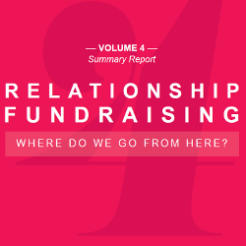Fundraisers would prefer to build deeper relationships with donors, but cannot do so because charity leaders force them into short-term approaches with "immediate returns on investment", according to a review published today.
The report, called Relationship Fundraising, Where Do We Go from Here? published today by Rogare, the fundraising think tank of Plymouth University, says fundraisers should be rewarded by how they make donors feel, rather than how much money they raise.
The report, authored by Ian MacQuillin and Adrian Sargeant, also strongly recommends that “nonprofits start rewarding their fundraisers by how they make their donors feel. If you can focus on donor satisfaction, the money will surely follow”.
In order to do this, Rogare suggest “eschewing traditional metrics such as LTV, RFV, meeting income targets, etc.” and instead “developing bespoke metrics” by which the effectiveness of fundraisers’ can be more accurately measured.
As part of its research, Rogare spoke to a number of fundraising practitioners and found that the majority of the 31 survey respondents highlighted “problematic relationships with senior colleagues” which often manifested itself as “a short-term approach that demanded immediate returns on investment”.
The review said many fundraisers feel “that they don’t have the support, buy-in, or understanding of their colleagues and superiors: from trustees, chief executives and finance directors; and from the likes of communications staff and campaigners at a peer level” to be able to implement practical relationship fundraising.
The report, published in four volumes, is the result of a 12-month project undertaken by Rogare to both update and provide “the theoretical foundation” towards implementing the relationship fundraising theory first developed and espoused by Ken Burnett in 1992.
The first and second volumes contain literature reviews of theory and ideas relating to “relationship marketing” and “social psychology” respectively. The third volume contains “qualitative research” and a survey of “trends and challenges identified by practitioners”.
Ian MacQuillin, director of Rogare, said: “It is absolutely essential that relationship fundraising draws on the latest relevant theory to continually refresh and reinvigorate the ways it can deliver the best possible experience for the donor. This has been lacking over the past 20 or so years but is imperative to ensure relationship fundraising does not stagnate in the future and become little more than a fundraising ideology.
“Members of our advisory group said the relationships they had with colleagues were not sufficiently strong to allow relationship fundraising to flourish. So fundraisers must think beyond the donor and start improving all those relationships that are currently impinging on the donor relationships, particular with chief executives, boards and their supplier agencies.”









